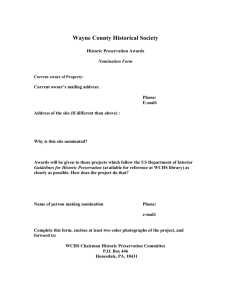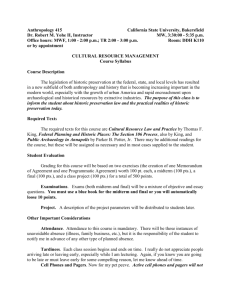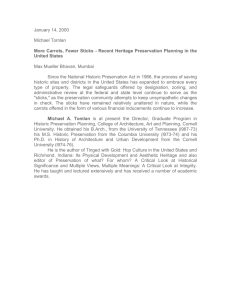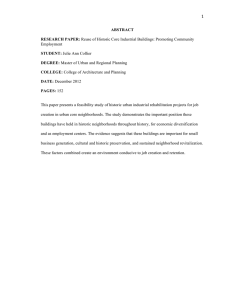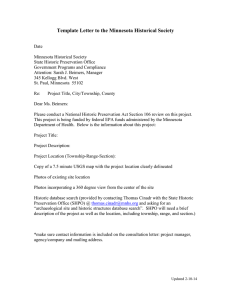P R F C
advertisement
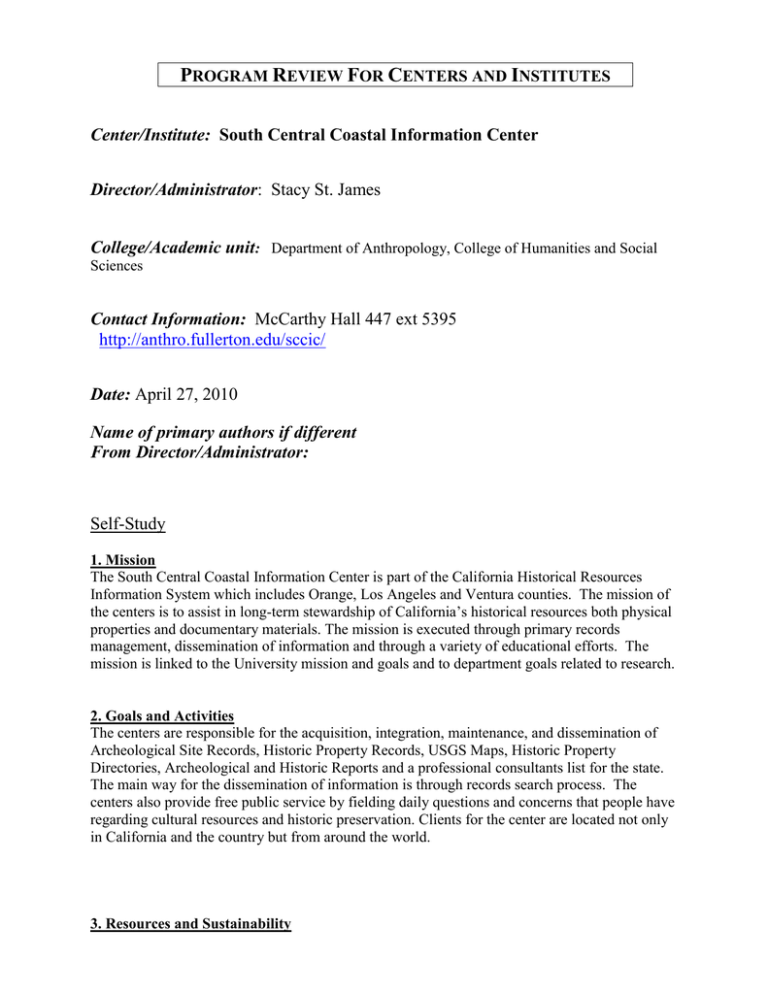
PROGRAM REVIEW FOR CENTERS AND INSTITUTES Center/Institute: South Central Coastal Information Center Director/Administrator: Stacy St. James College/Academic unit: Department of Anthropology, College of Humanities and Social Sciences Contact Information: McCarthy Hall 447 ext 5395 http://anthro.fullerton.edu/sccic/ Date: April 27, 2010 Name of primary authors if different From Director/Administrator: Self-Study 1. Mission The South Central Coastal Information Center is part of the California Historical Resources Information System which includes Orange, Los Angeles and Ventura counties. The mission of the centers is to assist in long-term stewardship of California’s historical resources both physical properties and documentary materials. The mission is executed through primary records management, dissemination of information and through a variety of educational efforts. The mission is linked to the University mission and goals and to department goals related to research. 2. Goals and Activities The centers are responsible for the acquisition, integration, maintenance, and dissemination of Archeological Site Records, Historic Property Records, USGS Maps, Historic Property Directories, Archeological and Historic Reports and a professional consultants list for the state. The main way for the dissemination of information is through records search process. The centers also provide free public service by fielding daily questions and concerns that people have regarding cultural resources and historic preservation. Clients for the center are located not only in California and the country but from around the world. 3. Resources and Sustainability The fiscal sustainability of the center appears strong. Since the center moved from UCLA to CSUF in 2000 consistent funding, careful planning, conservative spending of funds has ensured that the center is self-sustaining. The center’s average annual program income derived from feefor-service requests for the past three year period is $254,000. The center also receives an annual grant of $4,000 from the state Office of Historic Preservation. The center has three full time staff, one part-time staff, and one paid student intern. All interns are enrolled in Department of Anthropology programs. The Center is presently housed in 477 McCarthy Hall. 4. Organizational Structure and Governance The center is part of a state network of such centers coordinated by the state historic preservation officer. The eleven center coordinators engage in weekly conference calls to discuss activities. Sub-committees are often formed as needed to develop policies or procedures that are then presented back to the group on the weekly calls. An annual meeting of center coordinators, state officials and other guests takes place in Sacramento. Responsibility for the day to day operations of the center including the implementation of the contract terms between the host institution and Office of Historic Preservation is the role of the center coordinator. The center coordinator reports to the Chair of the Department of Anthropology. In addition, the center coordinator has the responsibility to see that procedures set forth by Auxiliary Services Corporation are followed. 5. Highlights and Accomplishments The centers are presently working on the development of standards and procedures for the electronic transfer of historical resources data between the Information Centers and the state office of Historic Preservation. Once developed these standards and procedures will result in a comprehensive, digital, statewide archive of cultural resource information. The eleven centers were recently awarded the Thomas F. King award for excellence in cultural resource management by the Society for California Archaeology. The center coordinator coordinates ongoing public and on campus outreach activities. 6. Planning and Strategic Outlook As mentioned above a key goal of the centers is to develop standards to transfer paper information into a digital format. When completed and approved these standards and procedures will serve as the guidelines for centers operations and will be published as a manual. The center’s strategic planning process is guided by three main goals which include consistently meeting contractual obligations with the Office of Historic Preservation, maintaining a positive and mutually beneficial relationship with the Department of Anthropology and the CSUF Auxiliary Services Corporation and continue to serve the needs of the public with regard to the preservation of collective cultural heritage. 7. Viability The center makes the case that it is a viable entity. This is based on the consistent nature of the center’s workload and the contractual relationship as the authorized archive for the state. In addition, the center maintains adequate funds to cover all necessary operating expenses for the current contract period and beyond. For the next three years there are no anticipated changes with regard to contractual arrangement with the state or the CSUF Auxiliary Services. There is leadership change in the college with the appointment of a new dean and the retirement of the present department chair. 8. Appendices Include a directory of the California Historical Resources Information System Account Balance statement Summary and Recommendation(s) The South Central Coastal Information Center (Center) is one of eleven such centers across the state of California administered by the Office of Historic Preservation. The Center is the official repository of cultural resources for Los Angeles, Orange and Ventura counties. The Center was relocated from UCLA to CSUF in 2000. The Center conducts its activities through primary records management, dissemination of information, providing technical advice and sponsoring educational activities. Affiliated with the Department of Anthropology the center has a coordinator who works closely with counterparts around the state and with the Office of Historic Preservation. A main goal of the centers state wide is to develop standards to transfer paper information to a digital format. The Center’s resources to operate are derived mainly from service fees. Over the last three years such fees accounted for $254,000. Aside from its services to clients from the state, nation and internationally, the Center also provides internships for students. The Center appears to have articulated clear goals, plans for the future and provides an important contribution to the academic life of the University and a valuable service to the state. Reviewed by the Council of Deans May 5, 2010 Action taken: Continuation Gerald W. Patton Director of Assessment and Educational Effectiveness
